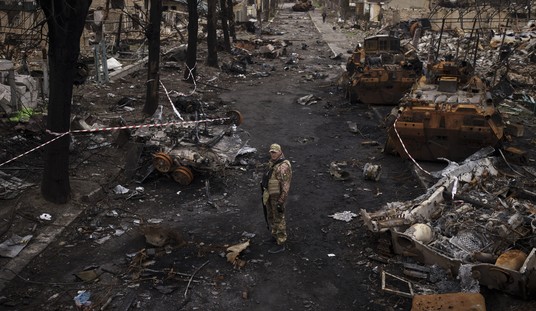Can Americans hold two thoughts in their head at the same time? Bill Maher told CNN’s Chris Cuomo last night that the rise of critical race theory from just a legal concept to a cultural belief system fits into his theory of “progressophobia.” Most prevalent among liberals, those afflicted can’t acknowledge the existence of problems and the fact of progress at the same time.
Is there racism in America? Sure, Maher says, and its history should be taught. But to claim that everything in America is racist is “just nuts,” and parents should be objecting when schools teach it — whether they call it CRT or not:
Bill Maher says both sides are trying to cancel him now and it's new.
“My politics have not changed. I am an old school liberal… they changed, not me,” he says on the issue of race. pic.twitter.com/QZ9rTSqVGq
— Cuomo Prime Time (@CuomoPrimeTime) November 18, 2021
MAHER: It’s just something going on in the schools that never went on before. Now, I’m not in schools. I have no interaction with children, whatsoever. But I do understand this issue, because I read accounts, from parents, from educators, from people, and this all over the country. If – when you say critical race theory, again, this is the binary situation, we always find ourselves in, in this country, if you say that, on MSNBC, people think that’s a great thing, because they’re finally teaching an honest history, of racism, in this country, which I know no one who is against that. I’m certainly not against that.
I think, I remember what my education was, with American history. We learned about the Civil War. I mean, they mentioned racism. We understood slavery and Lincoln and blah, blah, blah. But they didn’t really go into it any more than “Gone with the Wind” goes into it. It was there but you didn’t feel it, this really. Now we’re doing that, and I think that’s a good thing. People should understand that.
That’s different than teaching that racism is the essence of America. That’s what people get upset about, or involving children, who are probably not old enough, or sophisticated enough, to understand this very complicated issue, with a very complicated history.
CUOMO: So it’s that you have families – and we saw this resonate in Virginia. And I have people on all the time, who reject this premise. But we just saw it play out, so it must be real, to a lot of people, which is “You want to make White kids feel badly about what happened before them.”
MAHER: Right.
CUOMO: “And that their lives should be a function of making up for it. And I don’t want that put on my kid.”
MAHER: Yes. People are – kids are taught, and sometimes, separated into groups, oppressor and oppressed. Again, does a kid even know what those words mean? Would they gravitate toward that if you hadn’t told them? I mean you’re taking something that was getting better, race relations in America, and we – I think everyone recognizes, everyone right- thinking, in my view, that still a lot of work needs to be done. Remedial efforts need to be taken still. Racism is part of America.
But I did a thing one night about progressophobia, which is a term Steven Pinker called – termed – coined, which means somehow liberals got afraid to acknowledge progress. It’s two thoughts in your head at the same time. You can acknowledge that we have made great progress, on all the social issues, and yet, there is still more work to be done. We’re not saying “Mission accomplished.” We’re just saying, “Let’s live in the year we’re living in.”
You can’t come up with good solutions unless you’re realistic about what the problem is. I mean, it was only like 10 or 20 years ago that no state in America would vote for gay marriage. I mean, it was on the ballot, like 35 times. Now, it’s the law of the land, and no one is against it. I mean, when I was kid, I grew up in New Jersey, which is not a Southern state, and it was a completely White town. Now, a vast majority of Americans want to live in a racially-diverse neighborhood. That is a sea change, just in my lifetime.
Again, not mission accomplished, but can we just acknowledge, how far we’ve come, and where we are right now?
CUOMO: And the pushback becomes, “Well, it’s just the truth. We’re just telling them the truth, is that racism continues.”
MAHER: Right.
CUOMO: “It’s systemic.”
MAHER: Right. You know it’s there (ph).
CUOMO: “It’s in everything around us.”
MAHER: It’s–
CUOMO: “But you have to be taught, where it is everywhere, because that’s how we remedy it. And otherwise, you’re just hiding from the truth.”
MAHER: That’s nuts. It’s just – it’s just silly. It’s just virtue-signaling.
Did progressives become afraid to acknowledge progress — or did they just fear their ability to fundraise and organize off of any lack of it? That’s not a failing of progressives specifically — every advocacy group that achieves significant success eventually has to face the existential question of “what next.” In this case, however, the depiction of America as systemically racist despite having so much progress that we elected a black man as president — twice! — is “just nuts,” as Maher says, unless it’s deliberate as a means of self-preservation.
Another piece of evidence in the deliberate column is the attempt to obfuscate the influence that CRT has had on curricula in primary and secondary education. CRT provides the structure and ideology for so-called “anti-racism” pedagogy that results in the segregation tactics Maher describes above. An administrator in Indiana’s largest school district blew the whistle on the “no CRT” dodge a couple of weeks ago:
As an admin for the largest school district in Indiana, here's what we mean when we tell you that we aren't "teaching" Critical Race Theory: pic.twitter.com/f6RLghcw2R
— Tony Kinnett (@TheTonus) November 4, 2021
Yes, we told principals at the beginning of the year to lie to parents and tell them we weren't using CRT in schools. Yes, we continue to lie. pic.twitter.com/A9Qo5D77Pp
— Tony Kinnett (@TheTonus) November 4, 2021
As did Ross Douthat in the New York Times:
Glenn Youngkin attacked critical race theory, combining it with a larger attack on how the education bureaucracy has handled the pandemic, while McAuliffe denied that anything like C.R.T. was being taught in Virginia schools and also insisted that the whole controversy was a racist dog whistle.
The problem with the McAuliffe strategy is that it fell back on technicalities — as in, yes, fourth-graders in the Commonwealth of Virginia are presumably not being assigned the academic works of Derrick Bell — while evading the context that has made this issue part of a polarizing national debate.
That context, obvious to any sentient person who lived through the last few years, is an ideological revolution in elite spaces in American culture, in which concepts heretofore associated with academic progressivism have permeated the language of many important institutions, from professional guilds and major foundations to elite private schools and corporate H.R. departments.
Critical race theory is an imperfect term for this movement, too narrow and specialized to capture its full complexity. But a new form of racecraft clearly lies close to the heart of the new progressivism, with the somewhat different, somewhat overlapping ideas of figures like Ibram X. Kendi and Robin DiAngelo enjoying particular influence. And that influence extends into schools and public-education bureaucracies, where Kendi and DiAngelo and their epigones often show up on resources recommended to educators — like the racial-equity reading list sent around in 2019 by one state educational superintendent, for instance, which recommended both DiAngelo’s “White Fragility” and an academic treatise on the “Foundations of Critical Race Theory in Education.”
That superintendent was responsible for Virginia’s public schools.
The pushback to this criticism is the ridiculous strawman that white people don’t want slavery taught in schools. That’s absurd; we’ve taught about slavery and Jim Crow racism in schools since my primary school days, fifty years ago. Youngkin expressly endorsed teaching about it, in fact, just as Maher does here. There isn’t any movement, significant or not, to stop teaching those points in history. There is, however, a very broad movement arising to stop teaching children that ethnicity is determinative and that the color of their skin defines them, as well as indoctrinating them into CRT paranoia. Parents have had enough of virtue-signaling, both silly and destructive.








Join the conversation as a VIP Member